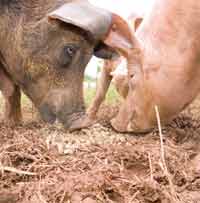Global meat trade hit by swine flu

The international meat trade appears to be ignoring official advice that swine flu cannot be caught by eating pork, with several countries erecting trade barriers and prices outside the UK taking a dive.
So far Russia, China, Indonesia, Serbia and Equador are among the countries to have imposed bans on imports of live pigs and pigmeat from Mexico and the USA, where most human cases of the disease have been recorded.
Reports are also coming in that some Japanese supermarkets have unilaterally removed North American pig products from their shelves, even though the government is keeping the borders open.
A host of organisations and individuals from both sides of the Atlantic have been trying to reassure customers that the new strain of flu is a human disease and has nothing to do with eating pigmeat.
But, despite these assurances, US pig prices fell sharply in the first half of the week, in anticipation of falling consumption at home and abroad.
By Wednesday (29 April) almost 10% had been knocked off the value of lean hogs and frozen pork bellies (used for bacon) on the Chicago Mercantile Exchange.
Closer to home, British retailers and pig producers insist there has been no adverse reaction so far.
A spokesman for leading supermarket Tesco said it had not seen any change in consumer spending habits – a message that was echoed by the British Retail Consortium, the Provision Trade Federation and a number of major processors.
Chris Clubley of Selby Livestock Auction Mart, who sold over 500 live pigs through the ring on Wednesday morning, insisted that the trade had been “as good as ever”. Cutters averaged 106p/kg lw and baconers 114p/kg lw, up slightly on the previous week.
Meat industry export Richard Brown of consultants Gira said the lack of reaction in the UK was not surprising, given the greater resilience of British consumers and the fact that fresh pork made up a lower percentage of overall pigmeat sales than in the rest of Europe.
But he believed there would be some short-term market reaction across Europe, even though this was “for no logical reason”. He had taken reports from Italy this week which suggested the wholesale price of pork legs had fallen by €1/kg, equivalent to a 25% drop.
“Experience with avian flu showed that Italy and France were very susceptible to market wobbles. This won’t be as bad as that, but there will be a short-term hit on international prices for pigmeat for sure.”
Danish pig market economist Karsten Flemin of Danske Slagterier insisted that, despite the immediate concerns, prospects for pig producers in the EU remained good.
* For a Farmers Weekly comment on this story, visit Phil Clarke’s Business Blog

